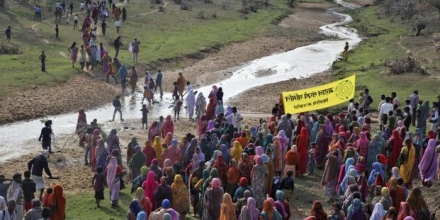Is anti-coal anti-poor? Constructing a transnational narrative for climate justice

Event details
RE&D Research Seminar
Date & time
Venue
Speaker
Contacts
India’s long-held global position – that of needing to grow to lift millions out of poverty – has now been ‘appropriated’ by corporations mining coal in Australia, and Australian governments committed to keeping Australia in ‘the business of coal’. With China’s coal demand falling in absolute terms, Australia, owing to its vast reserves, and India owing to its demand, stand out as the only two countries proceeding with major coal developments. At the same time scientific calculations show that all existing coal reserves must be phased out within the next decade and no new coalmines built to stay below 1.5 degrees of global warming. In such times, through the controversial mining operations of the Adani Group in Queensland’s Galilee Basin, a transnational political rhetoric legitimising coal by foregrounding the Indian poor has been established, pitting the moral case for intra-generational justice directly against the claims for intra-generational justice made by climate activism.
To respond to this rhetoric of ‘faux’ morality, the study draws on the narratives of anti-coal movements from India’s Singrauli district, known as India’s energy capital on account of supplying coal-based energy to eleven Indian states, and from the Australian resistance to Adani’s Carmichael mine that has been the focal point of joint efforts by environmental and climate groups, farmers and indigenous traditional owners to create a complex of imperatives and claims against coal in the present era. The complex links together environmental and climate justice narratives arising from multiple contexts – the grassroots in the Global South through resisting communities in Singrauli, civil society organisations in the global South through challenging coal’s national interest, the South within the global North through the land-resistance of the W&J traditional owners in Queensland, civil society organisations in the global North through the ‘big picture’ climate-centric resistance to Carmichael in Australia, and ‘new marginalised constituents’ in the Global North through the opposition of Queensland farmers to mining the Galilee Basin. The study argues that contrary to coal’s transnational political rhetoric that entrenches an outmoded morality, the transnational complex of anti-coal discourses reveals changing values of coal in present times and reveals the most critical justice issues pertaining to the most vulnerable constituents that need to be kept at the centre of energy transitions.
Ruchira Talukdar is a doctoral candidate in Social Sciences at the University of Technology Sydney. Her thesis is an ethnographic comparison of anti-coal movements in Singrauli, Madhya Pradesh, infamously known as India’s energy capital, and Australia, through the opposition to the Carmichael coalmine. Ruchira has over ten years of experience as an environmental advocate with NGOs in India (Greenpeace) and Australia (Greenpeace, Australian Conservation Foundation). She is also a regular writer and contributor on environmental politics in New Matilda and Newsclick.in .
Updated: 3 July 2024/Responsible Officer: Crawford Engagement/Page Contact: CAP Web Team











